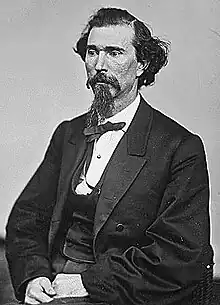Philip Johnson | |
|---|---|
 | |
| Member of the U.S. House of Representatives from Pennsylvania's 11th district | |
| In office March 4, 1863 – January 29, 1867 | |
| Preceded by | James Hepburn Campbell |
| Succeeded by | Daniel Myers Van Auken |
| Member of the U.S. House of Representatives from Pennsylvania's 13th district | |
| In office March 4, 1861 – March 3, 1863 | |
| Preceded by | William Harrison Dimmick |
| Succeeded by | Henry Wells Tracy |
| Member of the Pennsylvania House of Representatives | |
| In office 1853–1854 | |
| Personal details | |
| Born | January 17, 1818 Knowlton Township, New Jersey, U.S. |
| Died | January 29, 1867 (aged 49) Washington, D.C., U.S. |
| Political party | Democratic |
Philip Johnson (January 17, 1818 – January 29, 1867) was a Democratic member of the U.S. House of Representatives from Pennsylvania.
Biography
Philip Johnson was born in Polkville in Knowlton Township, New Jersey. He moved to Upper Mount Bethel, Pennsylvania, in 1839. He attended the common schools and Lafayette College in Easton, Pennsylvania, from 1842 to 1844. He was a plantation tutor in Mississippi from 1844 to 1846. He returned to Pennsylvania, studied law, and attended Union Law School in Easton.
He was admitted to the bar in 1848 and commenced practice in Easton. He served as county court clerk from 1848 to 1853. He was a member of the Pennsylvania House of Representatives in 1853 and 1854. He served as revenue commissioner of the third judicial district in 1859 and 1860. He was a delegate to the 1864 Democratic National Convention.
Johnson was elected as a Democrat to the Thirty-seventh, Thirty-eighth, and Thirty-ninth Congresses and until his death in Washington, D.C. Interment in Easton Cemetery.
See also
Sources
- United States Congress. "Philip Johnson (id: J000168)". Biographical Directory of the United States Congress.
- Philip Johnson at The Political Graveyard